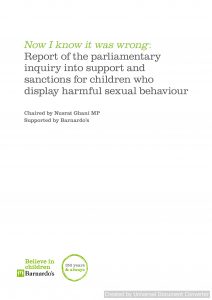Reports & Summaries
Now I Know It Was Wrong
 Full Article Name: Now I Know It Was Wrong: Report of the Parliamentary Inquiry into Support and Sanctions for Children Who Display Harmful Sexual Behaviour
Full Article Name: Now I Know It Was Wrong: Report of the Parliamentary Inquiry into Support and Sanctions for Children Who Display Harmful Sexual Behaviour
Open Access: Yes
Abstract
In recent times, the UK has woken up to the scale of child sexual exploitation, and the urgent need to keep our children safe from this horrific crime. Back in 2014, Barnardo’s supported a Parliamentary Inquiry chaired by Sarah Champion MP (Labour, Rotherham), which made a number of key recommendations, and the Government has since provided welcome leadership in this area, including through the Child Sexual Exploitation Summit on 3 March 2015, chaired by the Prime Minister. However, despite significant progress, far more needs to be done. Victims must be supported, perpetrators must be brought to justice, and crucially, there is a growing consensus that attention and resource must be directed towards prevention as well as response. Chief Constable Simon Bailey – the police chief with key national responsibility for this area – has confirmed that, in 2015, police forces in England and Wales spent £1bn investigating allegations of child abuse. This clearly underlines the economic case for prevention, but it also supports the moral case – by the time the police are involved, abuse has already occurred. We know that there is a strong link between children displaying harmful sexual behaviour at a young age going on to become perpetrators of abuse in adulthood, including child sexual exploitation. Equally, children who sexually abuse other children have often already suffered abuse and trauma themselves. In other cases, children make mistakes as they start to understand their sexuality and experiment with it. These children are unlikely to pose further risk to the public, given appropriate support, but unnecessarily criminalising or stigmatising them as a ‘sex offender’ at such a young age makes it more likely that they will struggle to regain a normal life, and increases their propensity to reoffend. Whilst in the most serious cases a criminal justice response is inevitable, all children in this situation must receive the high-quality therapeutic support they need to address the underlying causes of their behaviour, prevent them from causing further harm to themselves or others, and enable them to achieve positive outcomes in adulthood. Whilst harmful sexual behaviour includes very serious abuse, which can constitute a sexual offence, it also includes much more mainstream behaviours. ‘Sexting’, or sharing sexual images online, has become ubiquitous for the social media generation, and while it is not always harmful, it can carry significant risks for young people: once shared images can end up in the hands (or on the smartphones) of a whole school or adults seeking to groom children online. Significantly too, it is illegal, potentially resulting in criminal sanctions and a criminal record, which could severely undermine a child’s life chances. More generally, technology and the internet have transformed the way young people communicate, but also how they learn about the world. Easy access to pornography and pervasive sexualised content has created new challenges for keeping children safe. The Inquiry heard that harmful sexual behaviour has become much more prominent in recent years, with specialist services reporting increasing numbers of referrals. One of the outstanding questions is whether harmful sexual behaviour is not just more visible, but also more prevalent? The aim of the Inquiry, and this report, is to probe whether legislation, policy and practice are fit to protect our children in the society they are growing up in today, and to pre-empt the risks that may arise in the future.
Citation
Ghani, N. (2016). Now I know it was wrong: Report of the parliamentary inquiry into support and sanctions for children who display harmful sexual behaviour. Barnardo’s. https://www.basw.co.uk/resources/now-i-know-it-was-wrong-report-parliamentary-inquiry-support-and-sanctions-children-who
